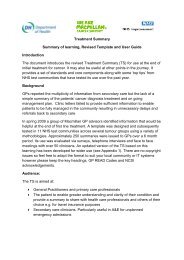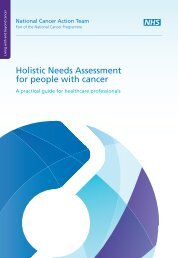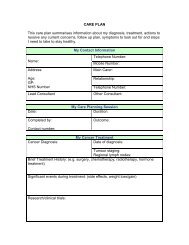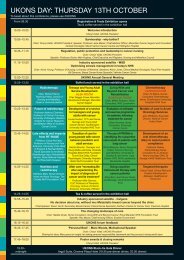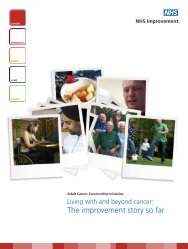HOPE Protocol [PDF, 420KB] - National Cancer Survivorship Initiative
HOPE Protocol [PDF, 420KB] - National Cancer Survivorship Initiative
HOPE Protocol [PDF, 420KB] - National Cancer Survivorship Initiative
You also want an ePaper? Increase the reach of your titles
YUMPU automatically turns print PDFs into web optimized ePapers that Google loves.
<strong>National</strong> <strong>Cancer</strong> <strong>Survivorship</strong> <strong>Initiative</strong><br />
Supported Self Management Workstream<br />
Outline Plan and Proposal for the Delivery and Evaluation<br />
of the <strong>HOPE</strong> Self-Management Programme for Breast<br />
<strong>Cancer</strong> Patients as part of the Birmingham East and North<br />
PCT Improvement Project.<br />
Nicola Davies<br />
Lynn Batehup<br />
20/08/09<br />
1
Self-Management Programme for Survivors of Breast <strong>Cancer</strong><br />
Birmingham Service Improvement Project <strong>Protocol</strong><br />
<strong>National</strong> <strong>Cancer</strong> <strong>Survivorship</strong> <strong>Initiative</strong>, Macmillan <strong>Cancer</strong> Support<br />
1. Background<br />
1.1. Introduction<br />
In the UK, there are an estimated two million cancer survivors, and this is expected to rise<br />
annually by more than 3% (KCL, 2008). There are currently limited support services<br />
available for people who have completed their primary treatment for cancer, and are living<br />
with and beyond cancer. This includes not only patients in remission, but also patients who<br />
may now live for many years with metastatic disease undergoing repeat cycles of treatment.<br />
The <strong>Cancer</strong> Reform Strategy (Allberry, 2008) highlights the need to commission services to<br />
support patients who may be dealing with the long-term consequences of cancer and the<br />
enduring effects of cancer treatments.<br />
The Self-Management Workstream of the <strong>National</strong> <strong>Cancer</strong> <strong>Survivorship</strong> <strong>Initiative</strong> (NCSI) has<br />
agreed the development of national cancer survivorship follow-up models for pilot testing of<br />
self-management support for survivors who will be at different stages of living with or beyond<br />
a diagnosis of cancer. This will be achieved as part of an NHS Improvement test community<br />
for new survivorship services within Birmingham East and North PCT, Good Hope Hospital,<br />
and Pan Birmingham <strong>Cancer</strong> Network. The programme will be offered to patients who have<br />
completed their treatment for primary breast cancer, as part of testing the redesign of the<br />
pathway for cancer follow-up and support.<br />
Self-management programmes are offering greater utility in the current climate of increased<br />
numbers of people living with chronic long-term conditions. Indeed, chronic disease selfmanagement<br />
has been shown in the US, Canada, and the UK to be effective on both a<br />
patient and health service level (Lorig et al., 1999; Holroyd et al., 1986; Lorig, Mazonson,<br />
and Holman, 1993; Watson et al., 1997).<br />
1.2. Self-Management Programmes<br />
The leading self-management programme is the USA-developed Chronic Disease Self-<br />
Management Program (CDSMP), a community-based generic programme applicable to all<br />
chronic conditions (Lorig et al., 1999). The CDSMP is designed around self-efficacy theory<br />
(Sieving et al., 1997; O‘Leary, 1985), with confidence in one‘s abilities to perform specific<br />
behaviours being one of the key factors in successful health behaviour change (O‘Leary,<br />
1985). In a five-year research project, the CDSMP was found to improve healthy behaviours<br />
(i.e. exercise, cognitive symptom management, coping, and communications with<br />
physicians) and health status (i.e. self-reported health, fatigue, disability, social/role<br />
20/08/09<br />
2
activities, and health distress), as well as decrease days in the hospital (The British Liver<br />
Trust, 1999).<br />
This gave rise to the concept of the expert patient and the introduction in the UK of the<br />
Expert Patient Programme (EPP) (an anglicised version of the CDSMP) in 2001 (DH, 2001).<br />
Like the CDSMP, the EPP is a lay-led self-management programme for all long-term<br />
conditions. The programme was motivated by the ‘Your Health, Your Care, Your Say’<br />
consultation showing that people with long-term conditions, for which cancer has now<br />
become, desire more control of their health via self-management (DH, 2006a). Evaluations<br />
of the EPP have provided support for the programme’s utility, but little engagement from<br />
health professionals has been highlighted as a potential limitation for cancer survivors<br />
(Wilson, 2008), and the respective benefits of lay versus professional trainers is yet<br />
unproven (Chodosh and Morton et al., 2005)<br />
Similarly, Macmillan provide the ‘New Perspectives course, a cancer version of the CDSMP<br />
(previously the ‘Living with <strong>Cancer</strong>’ course), a free six-week course for people living with and<br />
beyond cancer, which is facilitated by trained tutors who have also experienced cancer.<br />
Attendees meet each week for two and a half hours to learn new skills and techniques.<br />
Feedback from participants has been encouraging, and particularly favourable in terms of<br />
the positive thinking and goal-setting components of the course. A limitation of the course is<br />
the inflexibility of the programme, since tutors are required to follow guidelines rigidly.<br />
Interest is being shown in establishing whether a ‘co-creating health model’ might offer better<br />
outcomes. The Health Foundation uses the term ‘co-creating health’ to describe an active<br />
and collaborative partnership between patients and health professionals (Coulter and Ellins,<br />
2006). For guided self-management to be successful, a positive patient/physician<br />
relationship has been shown to be a key factor (Coulter, 1997; Clark and Gong, 2000;<br />
Holman and Lorig, 2000). In terms of patient preference, nurse-delivery is most often<br />
favoured (Pennery and Mallet, 2000).<br />
Taking into consideration the limitations of previous self-management programmes, the<br />
Helping Overcome Problems Effectively (<strong>HOPE</strong>) SMP, has been selected for this pilot study.<br />
Designed by Dr Andy Turner and Dave McHattie of Coventry University, <strong>HOPE</strong> is set within<br />
the theoretical framework of positive health psychology. It draws on evidence-based<br />
techniques to help enhance participants’ well-being and motivation and has been shown to<br />
improve positive affect (Barlow et al. 2000). Interestingly, 83% of participants attending<br />
Macmillan’s LWC Programme rated the positive thinking activity as beneficial, indicating the<br />
potential utility of a programme such as <strong>HOPE</strong> for cancer survivors. The programme also<br />
offers flexibility in that participants contribute to the final content of the course. The aim is to<br />
eventually integrate such a programme into service delivery.<br />
In order for this to be achieved, a mixed methodology approach will be required for the<br />
assessment of the pilot SMP, utilising both quantitative and qualitative data. Such an<br />
approach has been recognised as being essential in gaining a comprehensive<br />
understanding of the human experience (Yardley and Bishop, 2008). Any outcome<br />
measures utilised throughout the assessment will have undergone a comprehensive<br />
appraisal (Davies, 2009a,b).<br />
20/08/09<br />
3
2. Aims and Objectives<br />
The primary aim of this study is to pilot the <strong>HOPE</strong> SMP programme for women survivors of<br />
breast cancer. This will be achieved by meeting the following objectives:<br />
‣ Develop a tailored SMP for breast cancer survivors, based on the previously<br />
validated <strong>HOPE</strong> programme.<br />
‣ Evaluate course integration into service improvement.<br />
‣ Train professional and peer coaches to deliver the programme.<br />
‣ Evaluate patient-reported improvements.<br />
‣ Evaluate service improvements.<br />
3. Research Process<br />
3.1. Recruitment to Course<br />
Three cohorts of approximately 14 breast cancer survivors per group will be recruited, along<br />
with 4 women being on a ‘waiting list’ in case of drop out. Women diagnosed with breast<br />
cancer will be introduced to the SMP at the time of diagnosis, and provided with more<br />
specific information in the form of participant information packs at the time of entering posttreatment<br />
follow-up (i.e. 6-weeks after their final treatment). Recruitment on to the SMP will<br />
take place during the same post-treatment period.<br />
The inclusion criteria for SMP recruitment are:<br />
Primary Breast <strong>Cancer</strong><br />
Post-treatment (i.e. 6-weeks after final treatment session)<br />
The exclusion criteria are:<br />
Metastatic cancers<br />
Under 18 years of age<br />
Recruitment will be on a ‘first-come, first-serve’ basis, with excluded patients being provided<br />
with the opportunity to take part at a later date if the pilot is successful.<br />
Updated recruitment plan<br />
(i) Course 1(commenced 10/11/09)<br />
14 potential participants from the post treatment session Sept 09 7 – participants<br />
commenced – 3 attrition by week four.<br />
Send baseline questionnaires out to the 7 patients who declined the offer of the<br />
course ND – 4/12.<br />
Send end of course questionnaires out to the 3 patients who have dropped out by<br />
4/12 ND<br />
Complete end of course questionnaire on 15/12 – ND<br />
Ask one of the course participants if she would come and talk to patients at the post<br />
treatment group meetings about the course and her experience of it. AL<br />
(ii) Course 2 (to commence April 10)<br />
20/08/09<br />
4
Aim to recruit minimum of 20 participants on the basis of drop out.<br />
Raise awareness with key nurses as to the presence of the course – so that they can<br />
promote and inform patients from diagnosis onwards – AL to have some one to one<br />
meetings.<br />
Provide supplies of the course information leaflet in strategic places – clinics etc, and for<br />
Breast Friends, and get some poster size leaflets to put up in strategic places – AL<br />
Post Treatment Groups:<br />
Dec/Jan/Feb/Mar – AL 15 minute presentation and discussion<br />
Full contact details from admin – with NHS numbers and<br />
telephone contact as well as addresses<br />
Administration /completion of the baseline questionnaires at<br />
the end of the session – all<br />
Inform all that irrespective of participation on the course –<br />
would like to complete the Qs<br />
Attempt to have one of the participants from course 1 in<br />
attendance – to describe experience. If this is not possible –<br />
include the co-tutor from course 1.<br />
If Dec group takes place, - send invite letters out before<br />
Christmas – latest 21 st Dec if possible. AL<br />
*21 st January – presentation and discussion to post-treatment<br />
group, accompanied by a cohort 1 attendee who shared a<br />
poem about her experience; 5 BENPCT patients in attendance<br />
and will return forms if interested in attending <strong>HOPE</strong>.<br />
Venue<br />
Review the experience of the current venue, and consider the need for alternative settings –<br />
non hospital based. AL *To continue at Good Hope Hospital, based on patient preference.<br />
However, held 12-3pm, as opposed to in the evening, based on feedback from tutors.<br />
3.2. Delivery of Course<br />
a) Tutor Recruitment<br />
Each course will be delivered via a co-tutor approach by one trained nurse and one trained<br />
peer (a breast cancer survivor):<br />
Two nurses from Birmingham PCT have volunteered to train as professional tutors<br />
for the SMP. Training will be carried out over three days (2 + 1).<br />
Peer tutors will be invited in the following ways:<br />
o Selected patients who have completed treatment and have been identified by<br />
the Breast Clinical Nurse Specialists at Good Hope Hospital and the<br />
Community <strong>Cancer</strong> Specialist Nurse<br />
o Breast Friends – the local breast support charity<br />
o Macmillan <strong>Cancer</strong> Voices – Opportunities Exchange,<br />
the only criteria being that they must have completed their treatment. Interested women will<br />
be invited to an ‘Information Day’ organised to provide them with the necessary details to<br />
make an informed decision regarding their involvement. For those who remain interested,<br />
training will be carried out over 3/4 days.<br />
20/08/09<br />
5
) Tutor Training<br />
Training for both tutors will include a highly interactive programme of learning, reflecting on<br />
personal skills, recognising the underlying core values embedded in the programme, and<br />
developing the competences required to deliver the <strong>HOPE</strong> programme. A manualised<br />
delivery protocol will be produced for facilitators, which will assist future dissemination of the<br />
programme.<br />
The training meets many of the requirements of the NICE ‘Public Health Guidance 6:<br />
‘Behaviour change at population, community and individual levels’ and includes:<br />
<br />
<br />
<br />
<br />
<br />
<br />
<br />
Setting and agreeing patient-focused behavioural contracts (i.e. asking people to<br />
share their plans and goals with others)<br />
Intention-formation (i.e. helping people to form plans and goals for changing<br />
behaviours, over time and in specific contexts)<br />
Outcome expectancies (i.e. helping people to develop accurate knowledge about the<br />
health consequences of their behaviours)<br />
Personal norms (i.e. promoting personal commitments to behaviour change)<br />
Positive attitude (i.e. promoting positive feelings towards the outcomes of behaviour<br />
change)<br />
Relapse prevention (i.e. helping people develop skills to cope with difficult situations<br />
and conflicting goals).<br />
Self-efficacy (i.e. enhancing people’s belief and confidence in their ability to change).<br />
c) Venue<br />
The venue for the SMP will be the Partnership Learning Centre at Good Hope Hospital,<br />
Birmingham.<br />
20/08/09<br />
6
3.3. Project Timetable<br />
Recruitment onto the three SMP cohorts will be staggered, as shown in Table 1.<br />
Table 1: Project Timetable<br />
Cohort Baseline Taster<br />
Session<br />
1 W/C 5 th<br />
October<br />
2009<br />
2 W/C 8 th<br />
March 2010<br />
29th March<br />
2010<br />
Venue:<br />
Education<br />
Centre,<br />
Good Hope<br />
Hospital<br />
Time: 2pm -<br />
3.30pm<br />
SMP Delivery<br />
November 2009<br />
(10 th ; 17 th ; 24 th )<br />
December 2009<br />
(1 st ; 8 th ; 15th)<br />
April 2010 (22 nd ,<br />
29 th )<br />
May 2010 (6 th ;<br />
13 th ; 20 th , 27th)<br />
6-months<br />
Follow-Up<br />
W/C 14 th<br />
June<br />
2010<br />
W/C 15 th<br />
November<br />
2010<br />
12-months<br />
Follow-Up<br />
W/C 6 th<br />
December<br />
2010<br />
W/C 16 th<br />
May 2011<br />
3 W/C 10 th<br />
May 2010<br />
4th June<br />
2010<br />
Venue:<br />
Library<br />
Time: 2pm -<br />
3.30pm<br />
June<br />
2010 (10 th ; 17 th ;<br />
24 th ) July 2010<br />
(1st; 8 th ; 15 th )<br />
W/C 10 th<br />
January<br />
2011<br />
W/C 11 th<br />
July<br />
2011<br />
4. Measurement of Outcomes<br />
4.1. Expected Outcomes<br />
As a consequence of taking part in the SMP, it is expected that patients will:<br />
<br />
<br />
<br />
<br />
<br />
<br />
<br />
<br />
<br />
Gain confidence in self-management<br />
Gain confidence in seeking information<br />
Gain confidence in communicating with health care providers<br />
Increase their physical activity<br />
Eat more healthily<br />
Feel more hopeful<br />
Experience more gratitude<br />
Experience an improvement in quality of life<br />
Report more productive, collaborative healthcare utilisation.<br />
20/08/09<br />
7
4.2. Outcome Measures<br />
Baseline Data:<br />
Identifying Information: Name; Address; Phone Number; Hospital No.<br />
Demographic Data: Age 4 ; Ethnicity; Marital Status 5 ; Educational Status 6 .<br />
Disease-Related Data: Primary or Secondary Disease; Type of Treatment<br />
(Adjuvant v’s Neo-adjuvant; Surgery, Chemotherapy, Radiotherapy, Hormone<br />
Therapy); Duration of Treatment; Medications; Co-morbidities 7 .<br />
Health Behaviour Check: Perceived Health Status 8 ; Self-management efficacy;<br />
Exercise; Diet; Alcohol; Smoking.<br />
A core set of data will be collected through questionnaire completion, at baseline, on the final<br />
session, and then 6 and 12 months post-SMP. Details of data collection and analysis are<br />
presented in Table 2.<br />
20/08/09<br />
8
Table 2: Evaluating the <strong>HOPE</strong> Self-Management Programme<br />
Patient<br />
Experience<br />
Outcome Measure Data Collection Data Analysis<br />
Improved healthrelated<br />
quality of<br />
life<br />
Quality of Life of<br />
Adult <strong>Cancer</strong><br />
Survivors (QLACS)<br />
(Avis et al., 2005)<br />
<br />
<br />
<br />
Pre-course, returned by hand on first day of<br />
SMP. Collected by Anna Lynall (Project<br />
Support). 1<br />
Final session, administered and collected by<br />
Nicola Davies (Project Evaluation Coordinator).<br />
6 and 12 months post-SMP, by post. Mailed by<br />
Becky Wadsworth (Macmillan Administrator),<br />
including a SAE for return to Kelly Fisher<br />
(Service Improvement Facilitator). *Two-week<br />
follow-up prompt for return of questionnaires.<br />
Collected from Kelly Fisher by Nicola Davies.<br />
All QLACS 2 data to be analysed by Nicola<br />
Davies, including QLACS from Telecare:<br />
- Significant changes (i.e.<br />
improvement/decline) from:<br />
1) baseline to end of course<br />
2) baseline to 6mths<br />
3) baseline to 12mths<br />
4) end of course to 6mths<br />
5) end of course to 12mths.<br />
- Significant differences between<br />
SMP and Telecare.<br />
- Significant relationships between<br />
changes in quality of life and<br />
changes in self-management<br />
skills (heiQ) and health<br />
behaviours (HBC; GPPAQ).<br />
Increase in<br />
healthy eating<br />
and physical<br />
activity<br />
Health Behaviour<br />
Check (HBC)<br />
(Michie et al., 2008)<br />
General Practice<br />
Physical Activity<br />
Questionnaire<br />
<br />
<br />
<br />
Pre-course, returned by hand on first day of<br />
SMP. Collected by Anna Lynall. 1<br />
Final session, administered and collected by<br />
Nicola Davies.<br />
6 and 12 months post-SMP, by post. Mailed by<br />
Becky Wadsworth, including a SAE for return<br />
to Kelly Fisher. *Two-week follow-up prompt<br />
Nicola Davies to evaluate:<br />
- Significant changes from:<br />
1) baseline to end of course<br />
2) baseline to 6mths<br />
3) baseline to 12mths<br />
4) end of course to 6mths<br />
5) end of course to 12mths.<br />
20/08/09<br />
9
(GPPAQ)<br />
2006b)<br />
(DH,<br />
for return of questionnaires. Collected from<br />
Kelly Fisher by Nicola Davies.<br />
- Significant relationships between<br />
changes in health<br />
behaviours/physical activity and<br />
changes in quality of life (QLACS)<br />
and self-management skills<br />
(heiQ).<br />
Confidence and<br />
motivation to<br />
self-manage<br />
condition<br />
Health Education<br />
and Impact<br />
Questionnaire<br />
(heiQ): Selfmonitoring<br />
and<br />
Insight; Skill and<br />
Technique<br />
Acquisition; Health<br />
Service Navigation<br />
(Nolte et al., 2007)<br />
<br />
<br />
<br />
Pre-course, returned by hand on first day of<br />
SMP. Collected by Anna Lynall. 1<br />
Final session, administered and collected by<br />
Nicola Davies.<br />
6 and 12 months post-SMP, by post. Mailed by<br />
Becky Wadsworth, including a SAE for return<br />
to Kelly Fisher. *Two-week follow-up prompt<br />
for return of questionnaires. Collected from<br />
Kelly Fisher by Nicola Davies.<br />
Nicola Davies to evaluate:<br />
- Significant changes from:<br />
1) baseline to end of course<br />
2) baseline to 6mths<br />
3) baseline to 12mths<br />
4) end of course to 6mths<br />
5) end of course to 12mths.<br />
The impact of the SMP will be<br />
represented by three standardised<br />
categories of change derived from<br />
baseline and follow-up course<br />
assessments: 3<br />
+ substantial improvement = effect size<br />
equal to or above 0.5<br />
+ minimal/no change improvement =<br />
effect size of -0.49 to 0.49<br />
+ substantial decline = effect size equal<br />
to or below -0.5.<br />
- Significant relationships between<br />
changes in heiQ scores and<br />
changes in health<br />
behaviours/physical activity (HBC;<br />
GPPAQ) and changes in quality of<br />
20/08/09<br />
10
life (QLACS).<br />
Feelings of hope<br />
State Hope Scale<br />
(Snyder et al., 1996)<br />
<br />
<br />
Pre-course, administered on the first day of<br />
SMP by Andy Turner (<strong>HOPE</strong> Leader, Coventry<br />
University).<br />
Final session, administered and collected by<br />
Andy Turner.<br />
Andy Turner to assess changes in<br />
feelings of hope from pre-course to final<br />
session, and again at 6 and 12-months<br />
post-course.<br />
<br />
6 and 12 months post-SMP, by post. Mailed by<br />
Andy Turner, including SAE.<br />
Feelings of<br />
gratitude<br />
The Gratitude<br />
Questionnaire<br />
Questionnaire<br />
(McCullough et al.,<br />
2001)<br />
<br />
<br />
Pre-course, administered on the first day of<br />
SMP by Andy Turner.<br />
Final session, administered and collected by<br />
Andy Turner.<br />
Andy Turner to assess changes in<br />
feelings of gratitude from pre-course to<br />
final session, and again at 6 and 12-<br />
months post-course.<br />
<br />
6 and 12 months post-SMP, by post. Mailed by<br />
Andy Turner, including SAE<br />
Patterns of<br />
healthcare<br />
utilisation<br />
Lorig’s Healthcare<br />
Utilisation Scale<br />
(Lorig et al., 1996)<br />
<br />
<br />
<br />
Pre-course, administered on the first day of<br />
SMP by Andy Turner.<br />
Final session, administered and collected by<br />
Nicola Davies.<br />
6 and 12 months post-SMP, by post. Mailed by<br />
Becky Wadsworth (Macmillan Administrator),<br />
including a stamped addressed envelope for<br />
return to Kelly Fisher (Service Improvement<br />
Facilitator). *Two-week follow-up prompt for<br />
Nicola Davies to explore patterns of<br />
healthcare utilisation, including any<br />
significant changes, as well as any<br />
relationships between healthcare<br />
utilisation and scores on QLACS,<br />
GPPAQ, HBC, and heiQ.<br />
20/08/09<br />
11
eturn of questionnaires. Collected from Kelly<br />
Fisher by Nicola Davies.<br />
Satisfaction with<br />
the SMP<br />
Health Education<br />
and Impact<br />
Questionnaire<br />
(Programme<br />
Evaluation) (Nolte et<br />
al., 2007)<br />
<br />
Post-course, at the end of the final session,<br />
administered by Nicola Davies.<br />
Nicola Davies to assess, using<br />
descriptive statistics (i.e. percentages)<br />
to illustrate satisfaction with the SMP.<br />
Satisfaction with<br />
experience of<br />
intervention<br />
5-items of the Picker<br />
Experience of Care<br />
Questionnaire<br />
<br />
<br />
Administered at the final SMP session by<br />
Nicola Davies.<br />
Administered at the end of the other three<br />
interventions by Project Leads and returned to<br />
Kelly Fisher to forward to Nicola Davies.<br />
Nicola Davies to evaluate any significant<br />
differences between the experiences of<br />
care received across the four<br />
workstreams (i.e. SMP; Telecare;<br />
Bridges, ACM).<br />
1 All participants who declined attendance at the SMP will be sent pre-course baseline questionnaires, as mailed by Becky Wadsworth<br />
with a stamped addressed envelope for return to Kelly Fisher. *Two-week follow-up prompt for return of questionnaires. Collected<br />
from Kelly Fisher by Nicola Davies and evaluated for similarities within the group of non-responders/decliners, as well as differences<br />
between non-responders/decliners and attendees.<br />
2 QLACS returned questionnaire responses will be entered onto an SPSS statistical database by a cancer network Administrator,<br />
using guidelines provided by Nicola Davies.<br />
3 The distribution-based cut-off of 0.5 ES was chosen as a standardised cut-off and approximates a minimal important difference<br />
(MID) derived from several methodologies.<br />
*Each participant’s attendance will be recorded by Course Tutors, as overseen by Anna Lynall.<br />
*Cost-effectiveness will also be examined post-intervention by Birmingham PCT.<br />
20/08/09<br />
12
4.3. Focus Groups and Interviews<br />
Focus groups for <strong>HOPE</strong> participants will be held after the last intervention session. Semistructured<br />
interviews with tutors will be held after each completion of the three <strong>HOPE</strong><br />
interventions. A random subsample (n=3) of participants from each <strong>HOPE</strong> programme will<br />
also take part in a 6-month follow-up semi-structured interview to describe any lasting impact<br />
of the <strong>HOPE</strong> programme.<br />
5. Methods of Analysis<br />
Quantitative data elicited from questionnaires will be examined for statistical significance via<br />
the Statistics Package for Social Scientists (SPSS). It is anticipated that multiple regression<br />
analyses will be used in order to determine the extent that the SMP contributes to patientreported<br />
outcomes.<br />
Qualitative data will be analysed using Framework Analysis (Ritchie & Spencer, 1994),<br />
which was developed in the context of applied policy research to produce outcomes or<br />
recommendations. Framework analysis is often used where there are specific issues being<br />
addressed and where some themes are generated from a priori of issues identified in the<br />
research questions. However, the methodology is flexible enough to allow other themes to<br />
emerge from the data.<br />
6. Delivery Team<br />
Lynn Batehup - Project Manager for the Self-Management Workstream<br />
o Responsible for the design and coordination of the project and for ensuring that all<br />
aims and objectives are met with a rigorous manner.<br />
Kelly Fisher – Service Improvement Facilitator<br />
o Responsible for facilitating communication between Macmillan and Birmingham PCT.<br />
Nicola Davies – Self-Management Programme Evaluation Coordinator<br />
o Responsible for the methodological preparation and evaluation of the SMP, the<br />
production of protocols and reports, and advising on appropriate outcomes.<br />
Suma Surendranath – Self-Management Learning Programmes Development Manager<br />
o Responsible for the strategic and operational delivery of the SMP, providing ongoing<br />
support to SMP leaders.<br />
Dr Andy Turner – Professional <strong>HOPE</strong> course leader<br />
o Responsible for the delivery of the <strong>HOPE</strong> course and the evaluation of the course.<br />
Dave McHattie – Lay <strong>HOPE</strong> course leader<br />
o Responsible for the delivery of the <strong>HOPE</strong> course.<br />
20/08/09<br />
13
Anna Lynall – Project Support<br />
o Responsible for supplying onsite support, including facilitating data collection.<br />
20/08/09<br />
14
Footnotes<br />
1 A rapid review aimed at updating that of ‘Evidence to inform the <strong>Cancer</strong> Reform Strategy:<br />
The clinical effectiveness and cost-effectiveness of follow-up services after treatment for<br />
cancer, ‘as conducted by the Centre for Reviews and Dissemination (2007) is currently<br />
underway.<br />
2 Davies, NJ (2009a,b) Self-Management Programmes for <strong>Cancer</strong> Survivors: A Structured<br />
Review of Outcome Measures, commissioned by Macmillan <strong>Cancer</strong> Support for the NCSI.<br />
3 A report by the Picker Institute, commissioned by NHS Improvement and Macmillan <strong>Cancer</strong><br />
Support, demonstrated an implicit assumption among survivors and carers that ‘follow-up’<br />
care occurs when treatment has ended (Sheldon, Davis, and Parsons, 2008). Therefore, the<br />
baseline measurement period of 6-weeks post-treatment encompasses this shared definition<br />
whilst also providing time between final treatment and the intervention for survivors to<br />
become socially reintegrated.<br />
4 Health status evaluations have been demonstrated to change according to age and illness<br />
(Kaplan and Orna Baron-Epel, 2002); Demographic variables such as age and educational<br />
status might be important predictors of quality of life and thus need to be controlled when<br />
analysing data (Wenzel et al, 1999).<br />
5 Evidence exists in the way of social support being a potential buffer against disease<br />
progression (Smith et al., 1994), as well as being positively associated with better<br />
psychological well-being (Stanton and Snider, 1993; Rodrigue, Behen, and Tumlin, 1994)<br />
and better psychosocial adjustment (Heim et al., 1997).<br />
6 It is important to control for socio-economic status (SES) as it is related to health<br />
behaviours, such as breast screening (Yarbrough and Braden, 2001). However, the most<br />
effective method of measuring SES has been under debate, with potential indicators being<br />
income, occupation, postcode, educational status, to name a few (Deonandan et al., 2000;<br />
Shavers, 2007). Educational attainment is perhaps the most widely used indicator of SES<br />
due to the ability to characterise the educational achievement level of most individuals.<br />
Furthermore, education can be seen as the most basic component of SES because of its<br />
influence on other SES indicators such as occupation and income (Adler and Newman,<br />
2002). There are several possible mechanisms through which education might influence<br />
health status. For example, people with higher education may have developed better<br />
information-processing and critical thinking skills, skills in navigating health services, and<br />
abilities required to interact effectively with healthcare providers. Individuals with higher<br />
education may also be more likely to be socialised to health-promoting behaviour and<br />
lifestyles, and have better work, economic conditions, and psychological resources (Ross<br />
and Mirowsky, 1995; Yen and Moss, 1999). An advantage of using education as a measure<br />
of SES for adults is that the likelihood of reverse causation (e.g., which came first, poor<br />
health or low SES)—which can be a problem with other standard SES measures—is<br />
reduced, as education is usually complete before detrimental health effects occur (Stewart,<br />
2001).<br />
7 Co-morbidities have been found to correlate with various dimensions of quality of life in<br />
women with breast cancer (Davies et al., 2008).<br />
20/08/09<br />
15
8 Health status and quality of life are distinct concepts; improvement with one doesn’t<br />
necessarily correlate with improvements in the other, yet both are important indicators of<br />
outcome. In a number of studies self-rated health has been found to be an excellent<br />
predictor of future health and so improvements in this will be important for long-term wellbeing<br />
even if benefits are not yet evident. The most widely used measure of self-rated<br />
health is a one-item rating scale used in the <strong>National</strong> Health Interview Survey (Idler and<br />
Angel, 2000).<br />
20/08/09<br />
16
References<br />
1. Adler NE, Newman K. (2002). Socioeconomic disparities in health: Pathways<br />
and policies. Health Affairs, 21(2), 60-76.<br />
2. Allberry, J (2008) <strong>Cancer</strong> Reform Strategy: Maintaining Momentum, Building<br />
for the Future – First Annual Report. Department of Health, December 2008.<br />
3. Avis NE, Smith K, McGraw S, Smith RG, Petronis VM, Carver CS. Assessing<br />
quality of life in adult cancer survivors (QLACS). Qual Life Res 2005;14(4):<br />
1007–1023.<br />
4. Barlow, J.H., Turner, A.P., Wright, C. (2000), "A randomised controlled study<br />
of the arthritis self management programme in the UK", Health Education<br />
Journal, Vol. 15 No.6, pp.665-80.<br />
5. British Liver Trust. Living a healthy life with long term illness: leaders’ manual.<br />
The Board of Trustees, Leland Stanford Junior University, 1999.<br />
6. Centre for Reviews and Dissemination (2007) Evidence to inform the <strong>Cancer</strong><br />
Reform Strategy: The clinical effectiveness and cost-effectiveness of followup<br />
services after treatment for cancer, CRD.<br />
7. Chodosh, J; Morton A.C; Mojica W; Magione M; Suttorp M.J; Hilton L; et al<br />
Meta-analysis: chronic disease self management programmes for older<br />
adults, Ann Int Med, (2005); 143: 427-438.<br />
8. Clark, N.M. and Gong, M. (2000) Management of chronic disease by<br />
practitioners and patients: are we teaching the wrong things British Medical<br />
Journal, 320, 572–575.<br />
9. Coulter, A. (1997) Partnerships with patients: the pros and cons of shared<br />
clinical decision-making. Journal of Health Services Research and Policy, 2,<br />
112–121.<br />
10. Coulter A and Ellins J (2006) Patient-focused Interventions: A review of the<br />
evidence, Picker Institute Europe (01865 208100) and Health Foundation.<br />
11. Davies, N.J., Kinman, G., Thomas, R.J., Bailey, T.A. (2008) Health Baseline<br />
Comparison Theory: Predicting Quality of Life in Breast and Prostate <strong>Cancer</strong>,<br />
Health Psychology Update, Volume 17, Issue 3, pp. 3-12.<br />
12. Davies, NJ (2009a) Self-Management Programmes for <strong>Cancer</strong> Survivors: A<br />
Structured Review of Outcome Measures, commissioned by Macmillan<br />
<strong>Cancer</strong> Support for the NCSI, April 2009.<br />
17
13. Davies, NJ (2009b) Self-Management Programmes for <strong>Cancer</strong> Survivors: A<br />
Structured Review of Outcome Measures, Addendum to Review of April<br />
2009. Commissioned by Macmillan <strong>Cancer</strong> Support for the NCSI, May 2009.<br />
14. Deonandan R, Campbell MK, Ostbye T, Robertson J, Tummon I (2000). "A<br />
comparison of methods for measuring socioeconomic status by occupation or<br />
postal area." Chronic Diseases in Canada. 21(3):114-118.<br />
15. Department of Health (2001) The Expert Patient: A New Approach to Chronic<br />
Disease Management for the 21st Century. DH, August 2001.<br />
16. Department of Health (2006a) Your Health, Your Care, Your Say. DH<br />
Consultation, 2006.<br />
17. Department of Health (2006b) General Practise Physical Activity<br />
Questionnaire. Physical Activity Policy, Health Improvement Directorate, Best<br />
Practice Guidance. Department of Health, London.<br />
18. Heim E., Valach L., and Schaffner L. (1997). Coping and psychosocial<br />
adaptation: Longitudinal effects over time and stages in breast cancer.<br />
Psychosomatic Medicine, 59, 408-418.<br />
19. Holman, H.R. and Lorig, K. (2000) Patients as partners in managing chronic<br />
disease. British Medical Journal, 320, 526–527.<br />
20. Holroyd Kenneth A, Creer Thomas L. Self-management of chronic disease:<br />
handbook of clinical interventions and research. Orlando (FL): Academic<br />
Press;1986.<br />
21. Idler E, Angel RJ. Self-rated health and mortality in the NHANES-I<br />
Epidemiologic Follow-up Study. Am J Pubic Health 1990;80:445–452.<br />
22. Kaplan G., Baron-Epel O. (2003) What lies behind the subjective evaluation<br />
of health status Social Science and Medicine. 56 (8): 1669-1676.<br />
23. King’s College London, Macmillan <strong>Cancer</strong> Support and <strong>National</strong> <strong>Cancer</strong><br />
Intelligence Network, <strong>Cancer</strong> Prevalence in the UK, 2008.<br />
24. Lorig KR, Mazonson PD, Holman HR. Evidence suggesting that health<br />
education for self-management in patient with chronic arthritis has sustained<br />
health benefits while reducing health care costs. Arthritis and Rheumatism<br />
1993;36:439-46.<br />
25. Lorig K, Stewart A, Ritter P, González V, Laurent D, & Lynch J, Outcome<br />
Measures for Health Education and other Health Care Interventions.<br />
Thousand Oaks CA: Sage Publications, 1996, pp.24-25<br />
18
26. Lorig K, Sobel DS, Stewart AL, Brown BW, Bandura A, Ritter P, González<br />
VM, Laurent DD, Holman HR. Evidence suggesting that a chronic disease<br />
self-management program can improve health status while reducing<br />
hospitalization: a randomized trial. Med Care 1999; 37(1):5-14.<br />
27. McCullough, M.E., Kirkpatrick, S., Emmons, R.A., & Larson, D. (2001). Is<br />
gratitude a moral affect Psychological Bulletin, 127, 249-266.<br />
28. Michie S, Rumsey N, Fussell F, Hardeman W, Johnston M, Newman S, and<br />
Yardley L (2008) Improving Health: Changing Behaviour, NHS Health Trainer<br />
Handbook, Best Practice Guidance. Department of Health, London.<br />
29. Nolte S., Elsworth G.R., Sinclair A.J., Osborne R.H. The extent and breadth<br />
of benefits from participating in chronic disease self-management courses: A<br />
national patient-reported outcomes survey (2007) Patient Education and<br />
Counseling, 65 (3), pp. 351-360.<br />
30. O’Leary A. Self-efficacy and health. Behaviour Research and Therapy<br />
1985;23:437-51.<br />
31. Pennery E, Mallet J. A preliminary study of patients' perceptions of routine<br />
follow-up after treatment for breast cancer. Eur J Oncol Nurs. 2000<br />
Sep;4(3):138-45; discussion 146-7.<br />
32. Rodrigue, J. R., Behen, J. M., & Tumlin, T. (1994). Multidimensional<br />
determinants of psychological adjustment to cancer. Psycho-Oncology, 3,<br />
205-214.<br />
33. Ross, C. E., and Mirowsky, J. (1995). Does employment affect health<br />
Journal of Health and Social Behavior, 36, 230–243.<br />
34. Sheldon H., Davis A., and Parsons, S (2008) <strong>Cancer</strong> Follow Up Care: The<br />
Views of Patients and Carers Expressed in a Range of Focus Groups. Picker<br />
Institute Europe, 2008.<br />
35. Sieving R, Resnick MD, Bearinger L, Remafedi G, Taylor BA, Harmon B.<br />
Cognitive and behavioral predictors of sexually transmitted disease risk<br />
behavior among sexually active adolescents. Archives of Pediatrics and<br />
Adolescent Medicine 1997;151:243-51.<br />
36. Smith TW, Ruiz J, and Uchino BN (2004) Mental activation of supportive ties,<br />
hostility, and cardiovascular reactivity to laboratory stress in young men and<br />
women, Health Psychology, 23, pp. 476–485.<br />
37. Snyder, C. R.., Sympson, S. C., Ybasco, F. C., Borders, T. F., Babyak, M. A.,<br />
& Higgins, R. L. (1996). Development and validation of the State Hope Scale.<br />
Journal of Personality and Social Psychology, 2, 321-335.<br />
19
38. Stanton AL, Snider PR. Coping with a breast cancer diagnosis: a prospective<br />
study. Health Psychol. 1993 Jan;12(1):16-23.<br />
39. Stewart, Jennifer M. (2001) "The impact of health status on the duration of<br />
unemployment spells and the implications for studies of the impact of<br />
unemployment on health status," Journal of Health Economics, Elsevier, vol.<br />
20(5), pages 781-796, September.<br />
40. Watson PB, Town GI, Holbrook N, Dwan C, Toop LJ, Drennan CJ. Evaluation<br />
of a self-management plan for chronic obstructive pulmonary disease.<br />
European Respiratory Journal 1997;10:1267-71.<br />
41. Wenzel LB, Fairclough DL, Brady MJ (1999) Age-related differences in the<br />
quality of life of breast carcinoma patients after treatment. <strong>Cancer</strong>; 86: 1768–<br />
1774.<br />
42. Wilson P. The UK Expert Patients Program: Lessons learned and implications<br />
for cancer survivors’ self-care support programs. Journal of <strong>Cancer</strong><br />
<strong>Survivorship</strong> Research and Practice, 2007.<br />
43. Yarbrough SS and Braden CJ (2001) Utility of health belief model as a guide<br />
for explaining or predicting breast cancer screening behaviours. Journal of<br />
Advanced Nursing, Volume 33, Number 5, pp. 677-688(12).<br />
44. Yen IH. and Moss N. (1999) Unbundling education: A critical discussion of<br />
what education confers and how it lowers risk for disease and death. In Adler,<br />
N.E., Marmot, M., McEwen, B.S. & Stewart, J. (Eds.) (1999). Socioeconomic<br />
Status and Health in Industrial Nations: Social, Psychological and Biological<br />
Pathways. Ann NY Acad Sci. Vol # 896, 350-351.<br />
20


![HOPE Protocol [PDF, 420KB] - National Cancer Survivorship Initiative](https://img.yumpu.com/32566432/1/500x640/hope-protocol-pdf-420kb-national-cancer-survivorship-initiative.jpg)
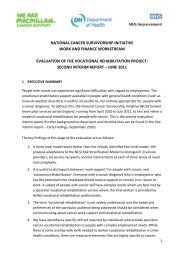
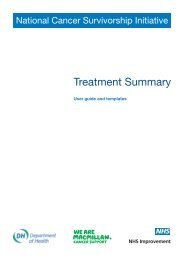
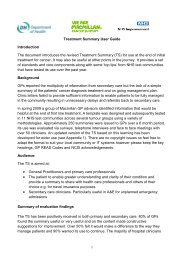
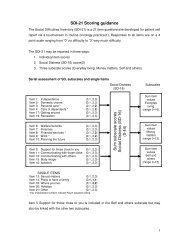
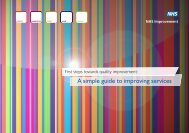
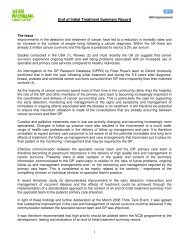
![Download the how to guide [PDF] - Macmillan Cancer Support](https://img.yumpu.com/47067428/1/184x260/download-the-how-to-guide-pdf-macmillan-cancer-support.jpg?quality=85)
